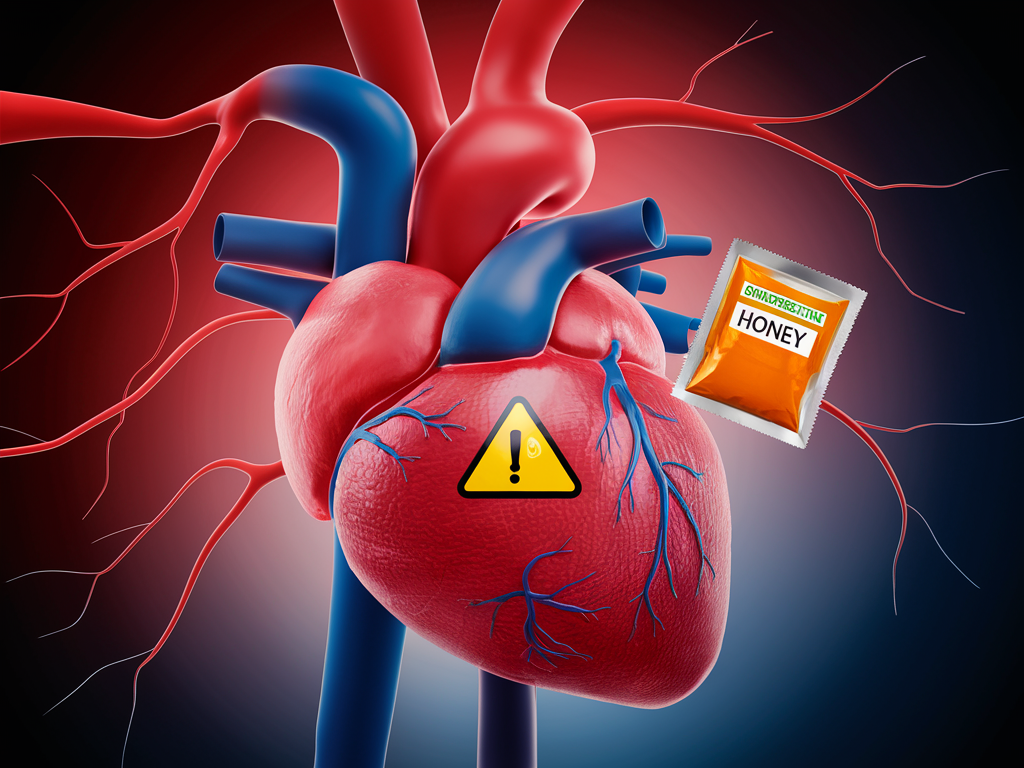Sexual enhancement supplements have gained significant popularity in recent years, with “honey packs” emerging as a trending product promising extraordinary benefits for intimate performance. These small, often attractively packaged supplements claim to provide instant and powerful effects for sexual stamina and pleasure. However, beneath their appealing marketing lies a concerning reality that consumers need to understand before considering their use.
These unregulated products have captured attention in online marketplaces and specialty shops, often promoted through word-of-mouth recommendations and social media. Their rising popularity stems from promises of natural enhancement without prescription requirements. This article explores the ten hidden dangers associated with honey packs that every potential consumer should know before making purchasing decisions that could impact their health.

Danger #1: Unregulated Ingredients
Unlike prescription medications for erectile dysfunction (ED) or other sexual health issues, honey packs exist in a regulatory gray area. The FDA doesn’t evaluate or approve these products before they reach consumers, creating significant safety concerns.
Laboratory analyses of various honey pack brands have revealed inconsistent formulations, with some containing completely different ingredients than what’s listed on their packaging. This lack of transparency means consumers cannot make informed decisions about what they’re putting into their bodies.
Many products claim to contain “natural” ingredients like honey, herbs, and plant extracts, but without regulatory oversight, there’s no guarantee these claims are accurate. Some samples have been found to contain synthetic compounds with unknown safety profiles, industrial chemicals, and other potentially harmful additives not disclosed on labels.
Danger #2: Undisclosed Pharmaceutical Compounds
Perhaps the most alarming discovery about honey packs is that many contain undisclosed prescription-grade medications. Multiple studies have found sildenafil (the active ingredient in Viagra), tadalafil (Cialis), or chemical analogs of these compounds in products marketed as “all-natural.”
These pharmaceutical ingredients require prescription for good reason: they’re potent vasodilators that can have serious consequences if taken improperly. The presence of these drugs without proper labeling constitutes illegal pharmaceutical distribution and puts consumers at significant risk.
Some honey packs contain pharmaceutical compounds in concentrations exceeding prescription dosages, while others include experimental or banned substances never approved for human consumption. This deceptive practice allows manufacturers to deliver noticeable effects while falsely claiming natural origins.
Danger #3: Potential for Dangerous Drug Interactions
The undisclosed pharmaceutical ingredients in honey packs create serious risks for drug interactions. Particularly concerning are interactions with cardiovascular medications, especially nitrates prescribed for heart conditions.
When PDE5 inhibitors (like sildenafil) combine with nitrates, the result can be a dangerous and potentially fatal drop in blood pressure. Many consumers with underlying heart conditions may be taking nitrates without realizing the life-threatening risks of combining them with honey packs.
Additional medication conflicts exist with alpha-blockers, antihypertensives, certain antifungals, and some antibiotics. Without proper medical guidance and transparent ingredient listings, consumers cannot evaluate these interaction risks appropriately.
Danger #4: Cardiovascular Risks
Even for individuals not taking other medications, honey packs pose significant cardiovascular risks. The vasodilating compounds often found in these supplements can cause unpredictable blood pressure fluctuations, particularly dangerous for those with pre-existing heart conditions.
Medical literature has documented cases of heart attacks, strokes, and dangerous arrhythmias following the use of unregulated sexual enhancement supplements. These events have occurred even in younger adults with no previously diagnosed heart issues.

Emergency room physicians report seeing patients with severe chest pain, palpitations, and other cardiovascular symptoms after taking honey packs. The risk increases with higher doses, alcohol consumption, or physical exertion during sexual activity.
Danger #5: False Marketing Claims
The marketing surrounding honey packs often includes extraordinary claims about sexual performance enhancement that have no scientific backing. Promises of hours-long performance, multiple consecutive encounters, and permanent enlargement effects are physiologically implausible and deliberately misleading.
Testimonials featured in marketing materials frequently come from paid actors or are entirely fabricated. Clinical studies cited in promotional materials often don’t exist or are fundamentally flawed in their methodology.
This deceptive marketing creates unrealistic expectations about sexual performance, potentially exacerbating psychological aspects of sexual dysfunction rather than addressing them. When products inevitably fail to deliver impossible results, consumers may blame themselves rather than the fraudulent product claims.
Danger #6: Contamination Risks
Many honey packs are manufactured in facilities without proper quality control measures or good manufacturing practices. Laboratory testing has revealed concerning levels of contamination in some products.
Heavy metals including lead, mercury, and arsenic have been detected in certain honey pack brands, likely resulting from contaminated raw materials or improper manufacturing processes. These metals can accumulate in the body over time, potentially causing serious health problems with continued use.
Microbial contamination is another significant concern, with some products testing positive for harmful bacteria, molds, and their toxic byproducts. Without proper regulation, there’s no guarantee of sterility or safety in the manufacturing process.
Danger #7: Psychological Dependency
Regular use of honey packs can create psychological dependency where users become convinced they cannot perform sexually without supplementation. This dependency can undermine natural confidence and create a cycle of reliance on these products.
Men who experience normal fluctuations in sexual performance may incorrectly attribute successful encounters to supplement use rather than natural variability. This misattribution reinforces dependency and prevents addressing underlying factors that might be affecting sexual health.
Sexual performance concerns often have psychological components including stress, relationship issues, or performance anxiety. Relying on supplements can prevent addressing these fundamental issues while creating a costly and potentially dangerous habit.
Danger #8: Bypassing Medical Evaluation
Perhaps one of the most overlooked dangers of honey packs is how they encourage consumers to self-medicate rather than seek proper medical care for sexual health concerns. Erectile dysfunction, decreased libido, and other sexual issues can be important warning signs of underlying health conditions.
Conditions including diabetes, cardiovascular disease, hormonal imbalances, neurological disorders, and psychological issues can first manifest as sexual dysfunction. Masking these symptoms with unregulated supplements delays diagnosis and treatment of potentially serious health problems.

Healthcare professionals can provide proper evaluation, diagnosis, and evidence-based treatment options for sexual health concerns. Bypassing this medical oversight means missing opportunities for comprehensive care that addresses root causes rather than symptoms.
Danger #9: Allergic Reactions and Side Effects
Without standardized formulations or ingredient transparency, honey packs pose significant risks for allergic reactions. Undisclosed ingredients may include common allergens, herbal compounds with sensitizing properties, or synthetic substances that can trigger immune responses.
Reported side effects from honey pack consumption include headaches, flushing, digestive distress, visual disturbances, priapism (painful, prolonged erection requiring medical intervention), and severe hypotension. These effects can range from uncomfortable to life-threatening.
The long-term effects of many ingredients found in honey packs remain unknown. Regular consumption of unidentified compounds, potentially contaminated with toxins, poses risks that cannot be fully evaluated without proper clinical studies.
Danger #10: Legal and Importation Issues
Many honey packs are manufactured in countries with minimal pharmaceutical regulations and imported through unofficial channels. This creates legal liability for consumers who may unknowingly possess illegal pharmaceuticals.
Customs agencies in numerous countries regularly seize shipments of these products, resulting in financial loss for consumers and potential legal complications. Some jurisdictions may consider possession of products containing undisclosed prescription drugs as a legal offense.
International purchases also lack consumer protections regarding product authenticity, safety, or refund policies. Consumers have little recourse when products are confiscated, cause health problems, or simply don’t arrive after payment.
Safer Alternatives for Sexual Health
For those experiencing sexual health concerns, numerous evidence-based alternatives exist that don’t carry the risks associated with unregulated supplements:
- Consultation with healthcare providers for proper diagnosis and treatment
- FDA-approved medications prescribed and monitored by physicians
- Lifestyle modifications including exercise, stress management, and improved nutrition
- Relationship counseling or sex therapy for psychological components of sexual function
- Treatment of underlying health conditions that may be affecting sexual performance
Conclusion
The allure of honey packs lies in their convenient, non-prescription accessibility and bold promises of enhanced sexual performance. However, these potential benefits come with significant and potentially life-threatening risks that consumers must understand.
From unregulated and undisclosed ingredients to dangerous drug interactions, cardiovascular risks, and the potential to mask serious health conditions, honey packs represent a concerning trend in sexual enhancement supplements. The lack of regulatory oversight and transparency creates a situation where consumers cannot make informed decisions about these products.
If you’re experiencing sexual health concerns, consulting with qualified healthcare professionals provides the safest path forward. Proper diagnosis, evidence-based treatments, and addressing underlying physical and psychological factors offers a comprehensive approach to sexual wellbeing without the hidden dangers of unregulated supplements.
Always prioritize your health and safety above quick fixes or supplements that seem too good to be true—because when it comes to honey packs, the risks far outweigh any potential benefits.

